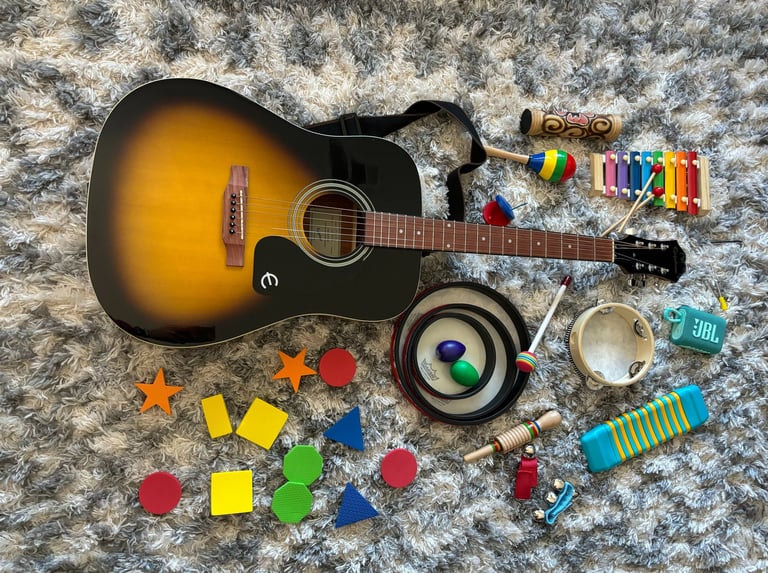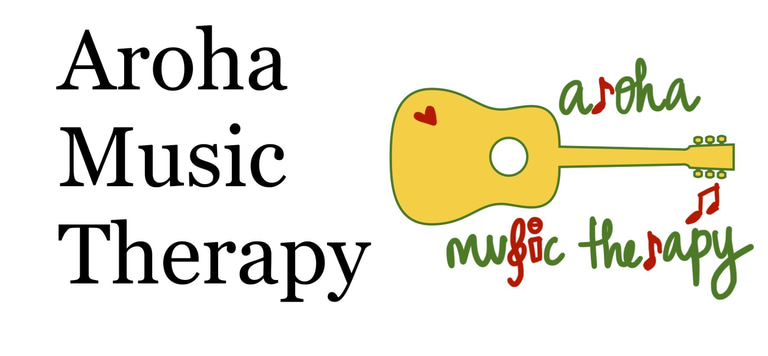What is Music Therapy?


Music therapy can benefit individuals of all ages. It can be offered individually/in groups at schools, hospitals, clinics, individuals’ houses, and care facilities.
MT-BCs individualize treatment plans, with each person’s diagnoses and needs, and current evidence in mind. Within the various domain areas, music therapy can address motor, social, emotional, spiritual, creative, communication, and sensory regulation domains. For more resources about music therapy, please visit the FAQ’s page.
Music therapy is the evidence-based use of musical interventions to address non-musical, functional goals. Music therapy can only be practiced by someone who is a board-certified music therapist (MT-BC). Some states, such as GA, have a state-specific license (LPMT) music therapists need to acquire to practice here.
How does music therapy work?
Music therapists use music-based interventions to achieve therapeutic goals. A licensed music therapist tailors sessions to an individual's specific needs. Techniques can include guided improvisation, songwriting, rhythmic activities, music listening, and instrument play to address sensory, emotional, social, communication, cognitive, or physical goals. We diligently use documentation to keep track of client progress, ensure ethical and legal compliance, and facilitate communication among healthcare professionals, clients, and families. Accurate and comprehensive documentation not only supports the therapeutic process but also serves as a vital record for ongoing treatment, billing, and evaluation.
What happens during a music therapy session?
Sessions vary based on the individual’s needs and treatment goals. Generally, the music therapist will begin by assessing the client’s needs and designing interventions that may include listening to or creating music, singing, playing instruments, or engaging in rhythmic interventions. Based on this assessment, the music therapist will consult with the individual/family members to create a treatment plan for future services.
What are the benefits of music therapy?
Music therapy has been shown to have various benefits, including:
Reducing stress and anxiety
Improving mood and emotional expression
Enhancing cognitive function (executive functioning, memory, attention, learning, etc.)
Promoting motor skills, control, and coordination
Supporting speech and language development
Encouraging social interaction and communication
Providing a sense of control and empowerment
How long does a music therapy session last?
Music therapy sessions typically last around 50 minutes, depending on the age, condition, and needs of the client. The remaining 10 minutes of the billable hour is used for documentation and session planning. The frequency and duration of sessions will depend on the client's needs, therapeutic goals, and progress of the client.
How does individual music therapy work?
Unlike group therapy, individual music therapy focuses entirely on the individual, tailoring the approach to their specific emotional, physical, sensory, and social needs. Individual music therapy can be beneficial for those with ADHD, Alzheimer's, Anxiety, Autism Spectrum Disorder, Dementia, Depression, Down Syndrome, learning disabilities, neurodevelopmental diagnoses, and Parkinson's.
The music therapist conducts an initial assessment to understand the client’s goals, challenges, and preferences. This helps create a personalized treatment plan that aligns with the client’s/family's therapeutic needs, whether it's for emotional expression, sensory regulation, creative expression, or other goals.
After the assessment, the music therapist facilitates various individualized interventions with their treatment goals in mind. The therapist might use a variety of musical interventions to address these goals including: active music listening, active music making, improvisation, music based reminiscing, and songwriting.
How does group music therapy work?
In a group, music therapists facilitates music-based interventions designed to achieve shared therapeutic goals. It creates a supportive, collaborative environment where participants can connect through music, while benefiting from the collective energy and interaction of the group.
The therapist carefully manages group dynamics to ensure that everyone feels safe, supported, and encouraged to participate. The therapist provides structure to the session but allows flexibility for spontaneous interactions and creativity. They may also observe group dynamics and intervene as needed to address interpersonal issues or guide the group toward deeper emotional or therapeutic exploration.The group setting can foster a sense of belonging and reduce feelings of isolation.
Similar to individual music therapy, group sessions include various music-based interventions, but with the added benefit of collaboration and shared experiences. These might include improvisation, lyric analysis, modified movement, rhythm-based interventions, song writing, etc. These interventions can address goals in various domains such as cognitive, emotional, motor, and social. Group music therapy allows individuals to connect with others who may share similar challenges or experiences, promoting social skills, empathy, and support. For some individuals, especially those who feel isolated, the group setting can be empowering and uplifting.
In groups, individuals can work on personal goals while contributing to the group’s collective well-being. Group therapy fosters a sense of camaraderie, cooperation, and mutual support.
What are the benefits of individual music therapy?
Individual music therapy can have various benefits, including:
Reducing stress or anxiety
Increasing sensory regulation
Improving communication skills (for those with speech or developmental challenges)
Enhancing motor skills or coordination (through playing instruments)
Supporting emotional regulation or improving mood
Promoting self-esteem and self-expression
Improving cognitive abilities (such as memory or attention, etc.)
Addressing these goals using music can promote enhanced communication/social skills, reduce individuals' stress, and provide opportunities for empowerment. Music provides a non-verbal outlet for emotions, helping individuals process grief, trauma, anxiety, depression, or other challenges as well.
What are the benefits of group music therapy?
One of the main strengths of group music therapy is the opportunity for social interaction and the development of interpersonal skills. A group setting can be motivating setting for individuals to work on their goals. Group music therapy has been shown to have various benefits, including:
Improve social and/or communication skills (leadership, turn-taking, collaboration, etc.)
Improve mobility (adapted, co-ordinated, etc.)
Improve self-confidence/self-expression in a group setting
Increase motivation and/or engagement
Reduce sense of isolation
Group music therapy can be beneficial for children and adolescents with behavioral or emotional needs, elderly individuals with Dementia or Alzheimer’s disease, individuals with mental health challenges (anxiety, depression, trauma, etc.), people with intellectual/developmental disabilities, Autistic individuals, people working through grief, loss, or life transitions, and anyone seeking to build social skills, confidence, or emotional resilience.


